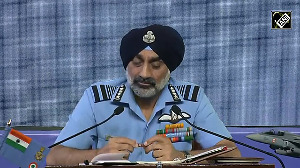US Under Secretary of State for Political Affairs Nicholas Burns has advanced his trip to India.
Burns, the chief United States negotiator of the US-India civilian nuclear agreement, will now visit New Delhi before the House of Representatives-Senate meets to reconcile the enabling bills that emerged from both Houses of the US Congress to facilitate the US-India nuclear agreement.
He hopes to convince the Indian leadership not to 'rock the boat' and to agree to the compromise legislation that emerges from the conference committee.
Senior administration sources told rediff India Abroad that Burns will be in New Delhi from December 7-8 for meetings with his new diplomatic counterpart Foreign Secretary Shiv Shankar Menon, for the first time and with Menon's predecessor Shyam Saran, his co-negotiator on the deal.
Burns will try and complete work on the bilateral US-India civilian cooperation agreement known as the 123 Agreement so that he can bring back the agreed draft to be reviewed by the House-Senate conferees.
The sources said Burns would also meet with Pranab Mukherjee for the first time in his new avatar as external affairs minister and possibly also have a brief interaction with Prime Minister Mamohan Singh to impress upon them that while the Bush administration would try to address India's concerns over some provisions in the Senate legislation, it would also do well for New Delhi to live with the conference committee legislation.
The legislation is expected to be closer to the Senate bill than the House bill and the closest to a near-perfect bill that the administration and India can hope for.
Last month, in an interaction with a few journalists immediately after the Senate vote, Burns said, "We are pleased with this bill and we do think it conforms to the agreement that we negotiated with India."
According to the sources, Burns may also travel to Hyderabad on December 10 to meet with Dr Anil Kakodkar, chairman of India's Atomic Energy Commission, who has continued to express concerns over some provisions in both the House and Senate bills.
Burns wants to address the scientific establishment's doubts about cooperation in certain areas like joint research with the US National Nuclear Security Administration in non-proliferation and nuclear safety.
Kakodkar told reporters last week in Hyderabad, "We do not want to get into any joint activity that will become intrusive," and that, in particular, "it should not have any impact on our strategic programme."
Earlier, Burns said he would visit New Delhi only in mid-December after the House-Senate conference committee completes its work, but sources said his advancing his trip apparently was a consequence of consultations and meetings he has had with Senate and House staffers and some key protagonists of the bill who had made it clear that while some changes in the language was possible to address India's concerns, there was unlikely to be any dilution or dropping of required presidential certifications like the one tagged on in the Harkin Amendment on Iran or Sections 106 and
107 of the Senate bill.
Section 106 prohibits the export of any equipment, materials or technology related to the enrichment of uranium, the processing of spent fuel, or the production of heavy water; Section 107 requires an end-use monitoring programme to be carried out with respect to US exports and re-exports of nuclear materials, equipment and technology sold or leased to India.
Administration sources said besides trying to nail down the 123 Agreement and convincing India not to quibble over the compromise legislation that finally emerges from the House-Senate conference, Burns would also jointly co-chair a meeting of the US-India strategic dialogue with Menon.
State Department Spokesman Sean McCormack said the US-India nuclear agreement remains the administration's top priority during Congress's lame-duck session, and added, "We would hope and encourage Congress not to make changes to the legislation that would materially affect our ability to implement the agreement."
He said there were a number of specific amendments and particular concerns that various Senators and Congressmen and staff members have raised and which the administration was trying to address.
McCormack refused to comment on any specific language with regard to India's cooperation in terms of isolating Iran over its alleged clandestine nuclear weapons programme.
Congressional sources told rediff India Abroad that the Harkin Amendment adopted by the Senate on November 16 is unlikely to be removed despite India's concerns, and if at all, there would be attempts by some, to further strengthen it.
The Harkin Amemdment, introduced by Iowa Democrat Senator Tom Harkin, one of the dozen Senators who voted against the legislation, calls for the president to determine that India is actively supporting US and international efforts to contain and if necessary sanction Iran's nuclear programme in a manner consistent with UN Security Council.





